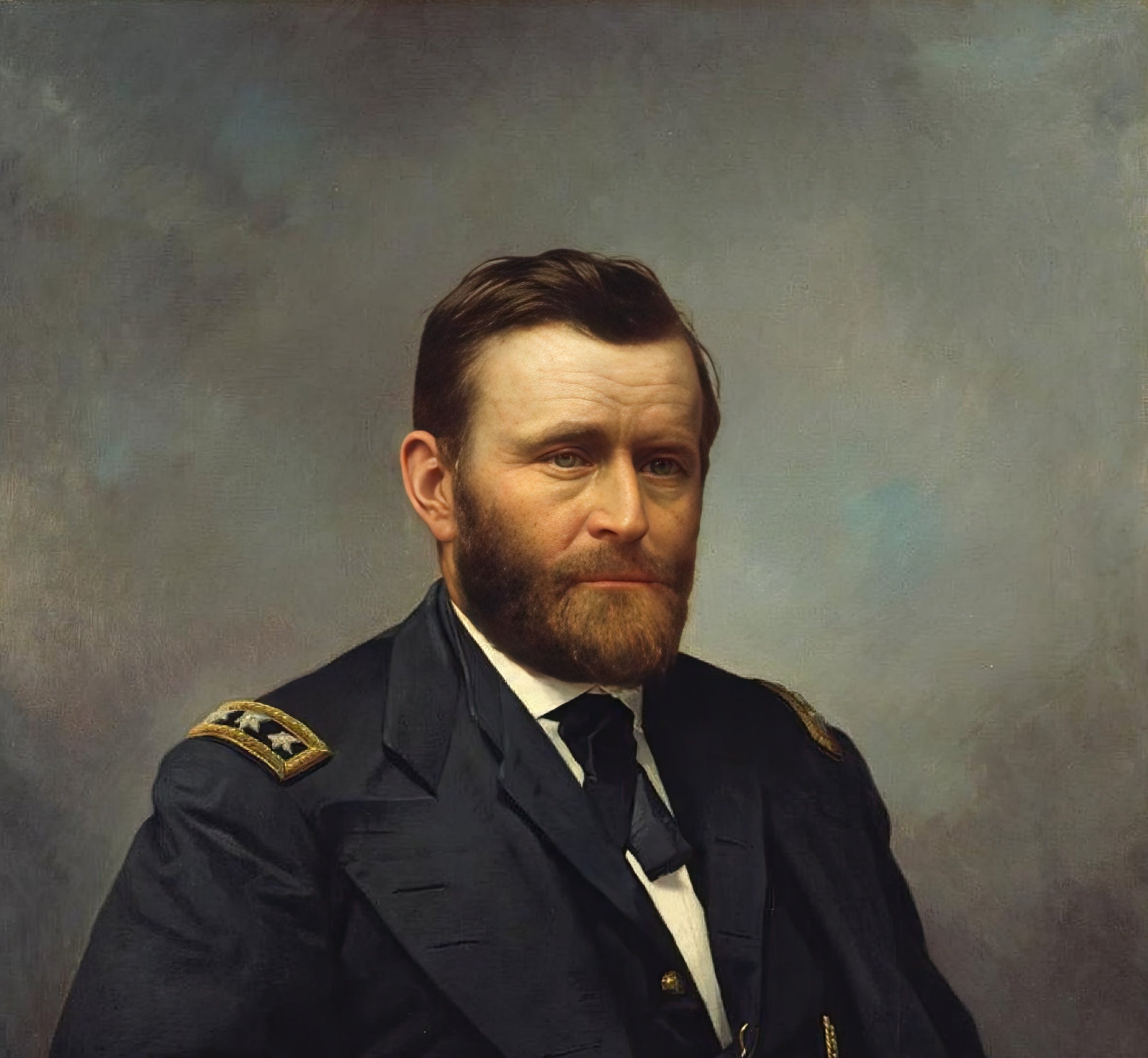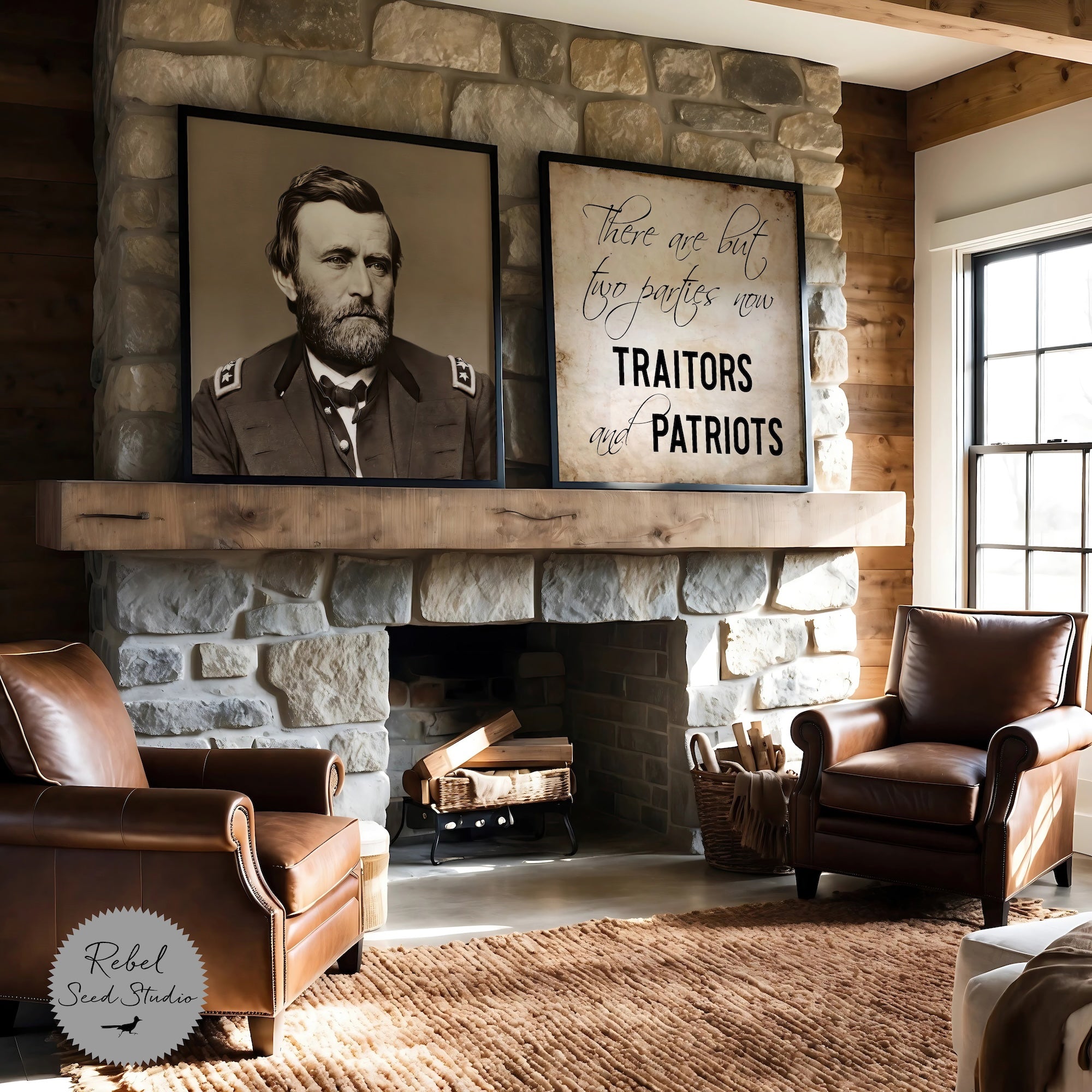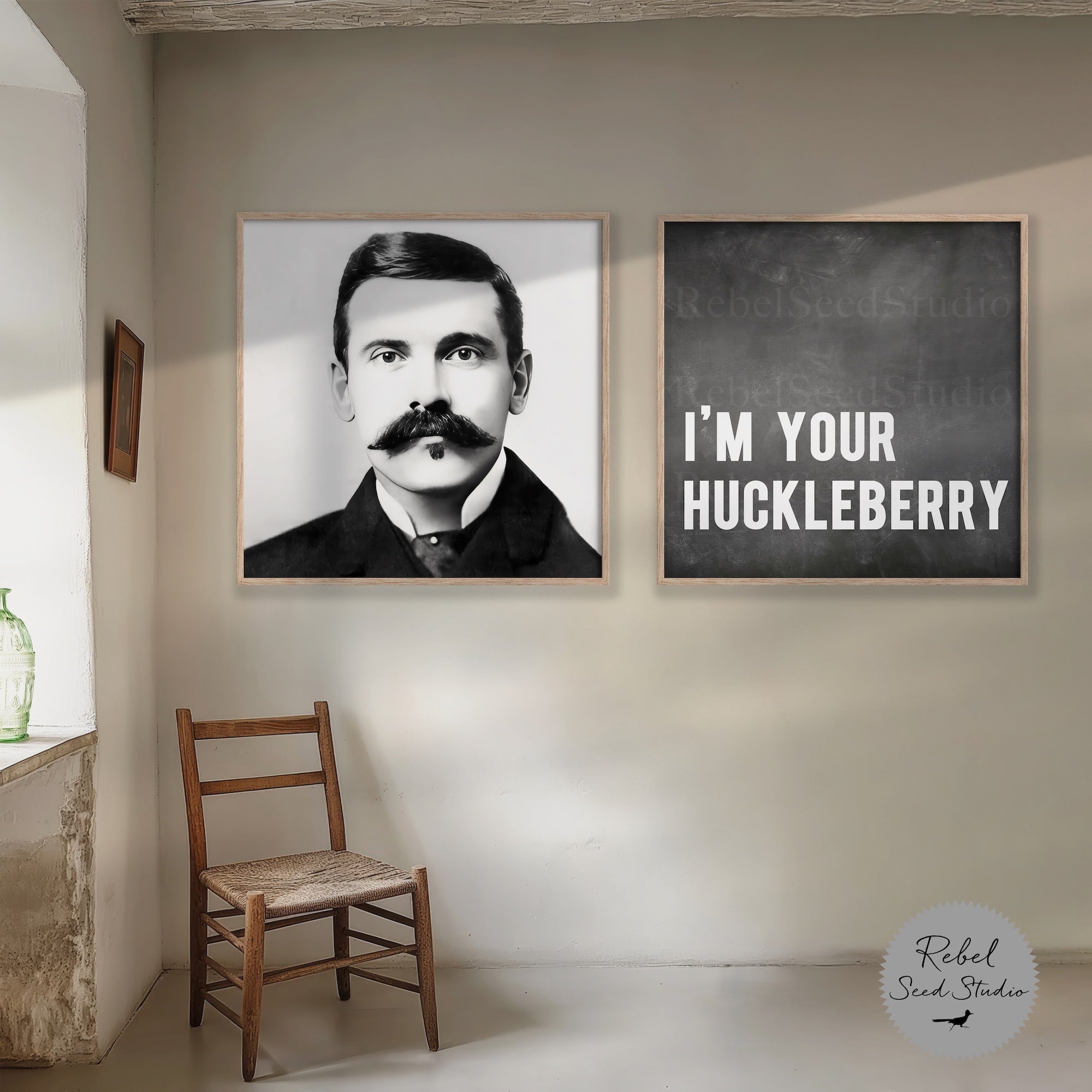
Ulysses Simpson Grant (Historical Reprint)
Historical article reprinted from the book "Men of Our Times: Leading Patriots of the Day" written by Harriet Beecher Stowe in 1868.
Related Art: Grant Series
When the perception of our late great military crisis first came upon us, and we found ourselves engaged in an actual and real war, our first inquiry was for our General.
For years and years there had been only peace talk and peace valuations in our market. There had, to be sure, been some frontier skirmishing—a campaign in Mexico, which drew off our more restless adventurers, and gave our politicians a little of a smart, martial air, in rounding their periods, and pointing their allusions. We had played war in Mexico as we read romances, and the principal interest of it was, after all, confined to our very small regular army of some twenty-five thousand men, where some got promotions in consequence of the vacancies made in this or that battle.
Gen. Scott won European renown and some laurels in this country. We created an office of Lieutenant General on purpose to do him honor; but the people, after all, laughed in their sleeves, and irreverently called our national hero "Old Fuss and Feathers;" a nickname which went far to show that whatever his talents in the field might be, he had not succeeded in establishing over the body of his countrymen the ascendency which strong minds hold over weak ones.
But when the hour of our trial came, we had to look to him as our leader, and Gen. Scott accepted cheerfully the situation, whose reality and magnitude neither he nor we, nor any mortal living at that time, perceived, or could estimate. Seward smiled in his cabinet chair, and spoke of the affair as a little skirmish that would be over in ninety days. A battle or two, might occur, then an armistice, and then "We, Us and Company" would walk in with our red tape and circumlocution office, and tie up everything better than before. So, Scott spread his maps and talked cheerfully, and the Washington cabinet congratulated one another. "This is to be my last campaign," said Scott, "and I mean it to be my best."
The country listened with earnest ears now to what our chief military man said. When the father of a family is lying between life and death, there is no more laughing at the doctor—and in the solemn hush that preceded real war, there was no more sneering at old Fuss and Feathers. People wanted to believe in him. They searched out his old exploits, talked of his old successes, that they might hope and believe that they had a deliverer and a leader in their midst.
Slowly, surely, it began to appear through many a defeat, many a disaster; through days and nights when men's hearts failed them for fear, and for looking for the things that were coming on the earth; through all such signs and wonders as usher in great convulsions of society—it began to be manifested that this nation was in a contest for which there were no precedents, which was to be as wide as from ocean to ocean, which was to number its forces by millions, and for which all former rules and ordinances of war, all records of campaigns and battles, were as mere obsolete ballads and old songs. The inquiry began to grow more urgent: Who is to be our General?
General Scott professed that the work was too great for him, but he called to his right hand and presented to the nation one whom he delighted to honor, and who was announced with songs and cheerings as the young Napoleon of America.
The nation received him with acclamation. They wanted a young Napoleon. A young Napoleon was just what they needed, and a young Napoleon therefore they were determined to believe that they had; and for a while nothing was heard but his praises. Every loyal paper was on its knees in humble expectancy, to admire and to defend, but not to criticize. Mothers were ready to send their sons to his banner; millionaires offered the keys of their treasure chests for his commissariat; the administration bowed to his lightest suggestion, gave him all he asked, hung on his lightest word. Everywhere he moved amid victorious plaudits, the palms and honors of victory everywhere credited to him in advance by the fond faith of the whole nation.
We waited for victories. Our men were burning with enthusiasm—begging, praying to be led to the field, and yet nothing was done. "It takes time to create an army," was the first announcement of our chief. We gave him time, and he spent it in reviews, in preparations, in fortifications and entrenchments. The time he took gave the enemy just what they stood in perishing need of—time to organize, concentrate, drill, arrange with Europe, and get ready for a four years' conflict.
It was God's will that we should have a four years' war, and, therefore, when we looked for a leader, he sent us Gen. McClellan.
It was God's will that this nation—the North as well as the South—should deeply and terribly suffer for the sin of consenting to and encouraging the great oppressions of the South; that the ill-gotten wealth which had arisen from striking hands with oppression and robbery, should be paid back in the taxes of war; that the blood of the poor slave, that had cried so many years from the ground in vain, should be answered by the blood of the sons from the best hearth stones through all the free States; that the slave mothers, whose tears nobody regarded, should have with them a great company of weepers, North and South—Rachels weeping for their children and refusing to be comforted; that the free States, who refused to listen when they were told of lingering starvation, cold, privation and barbarous cruelty, as perpetrated on the slave, should have lingering starvation, cold, hunger and cruelty doing its work among their own sons, at the hands of these slave masters, with whose sins our nation had connived.
General McClellan was like those kings and leaders we read of in the Old Testament, whom God sent to a people with a purpose of wrath and punishment.
Slowly, through those dark days of rebuke and disaster, did the people come at last to a consciousness that they had trusted in vain—that such a continued series of disasters were not exceptions and accidents, but evidence of imbecility and incompetence in the governing power.
Meanwhile the magnitude of this colossal war had fully revealed itself—a war requiring combinations and forces before unheard of, as different from those of European battles as the prairies of the West differ from Salisbury Plain, or the Mississippi from the Thames—and we again feverishly asked, where is our leader?
We had faith that some man was to arise; but where was he? Now one General, and now another took the place of power, and we hoped and confided, till disaster and reverses came and threw us on our unanswered inquiry.
Now it is very remarkable that in all great crises and convulsions of society, the man of the hour generally comes from some obscure quarter—silently, quietly, unannounced, unheralded, without prestige, and makes his way alone and single-handed.
John the Baptist said to the awakened crowd, thrilling with vague expectation of a coming Messiah, "There standeth one among you whom ye know not," and the same declaration might amount to a general principle, which would hold good in most cases when the wants of a new era in society call for a new leader.
When France lay convulsed after the terrible upheavings of the French Revolution, there was one man strong enough to govern her, to bring back settled society, law and order—but he was doing duty in an obscure place as corporal of artillery; and in like manner when the American war broke out, the General who was to be strong enough, and wise enough, and energetic enough to lead our whole army to victory, was an obscure, silent, sensible man, who was keeping a leather and saddle store in Galena, Ill.
He was a man principally to be noted for saying little, and doing with certainty and completeness the duty he happened to have in hand. If he failed in any of the points required in a successful storekeeper in a Western town, it was in the gift of talking. He had no opinions on politics, no theories about the government of the country, to put at the service of customers. The petty squabbles of local politics he despised. When one endeavored to engage him in a discussion of some such matter, he is said to have answered:
"I don't know anything of party politics, and I don't want to. There is one subject on which I feel perfectly at home. Talk to me of that and I shall be happy to hear you."
"What is that?"
"Tanning leather."
Yet this quiet man, who confined his professions of knowledge entirely to the business he took in hand, was an educated man, who had passed with credit through the military academy at West Point, graduated with honor, been promoted for meritorious service in the Mexican war to the rank of captain, and whose powers of conversation, when he chooses to converse on any subject befitting an educated man, are said by those who know him best, to be quite remarkable.
In these sketches of our distinguished men, we have, whenever possible, searched somewhat into their pedigree; for we have firm faith in the old maxim that blood will tell.
It is interesting to know that there are authentic documents existing, by which Gen. Grant's family may be traced through a line of Puritan patriots far back to England.
A gentleman in Hartford, justly celebrated for his research in these matters, has kindly offered us the following particulars: "On the first page of a thick little memorandum book, which is now before me, well preserved in its original sheepskin binding, are the following entries, the obsolete spelling of which sufficiently attests their antiquity: May the 29 1645, Mathew Grant and Susanna ware maried. Mathew Grant was then three and fortey yeares of age, seven moneths and eyghtene dayes; borne in the yeare, 1601. October 27 Tuesdaye. Susannah Graunt was then three and fourtey yeares of age seuen weeks & 4 dayes; borne in the yeare 1602 April the 5 Mondaye."
This, as appears, was a second marriage, and Susannah was widow of one William Rockwell; and immediately after the record, follow the names of the children of her first marriage, five in number. Ruth Rockwell, the second daughter of Susannah Grant, married Christopher Huntington, of Norwich, and their great granddaughter, Martha Huntington, married Noah Grant, a great grandson of Mathew.
From this marriage came a second Noah Grant, who was a captain in the old French war, and afterwards settled in Coventry, Conn. The third son of this Captain Noah Grant, who also bore the name of Noah, resided in Coventry, and had a son named for the Hon. Jesse Root, Chief Justice of the Superior Court of Connecticut from 1796 to 1807, and this Jesse Root Grant is the father of Ulysses S. Grant, the man whom this war anointed to be our leader and captain.
The Mathew and Susanna Grant whose marriage record is here given, came first to America in the Mary and John, in the company which settled Dorchester, Mass., in 1630. They sailed from Plymouth, in Devonshire, March 20th, and arrived at Nantasket, May 30th.
The style and spirit of these colonists may be inferred from the following words of Roger Clap, who was one of the passengers: "These godly people resolved to live together; and therefore they made choice of these two reverend servants of God, Mr. John Wareham, and Mr. John Maverick, to be their ministers; so they kept a solemn day of fasting in the New Hospital in Plymouth, England, spending it in preaching and praying; where that worthy man of God, Mr. John White, of Dorchester, in Dorset, was present and preached unto us the Word of God, in the fore part of the day, and in the latter part of the day. As the people did solemnly make choice of and call those godly ministers to their office, so also the Rev. Mr. Wareham and Mr. Maverick did accept, thereof, and expressed the same. So, we came by the good hand of the Lord through the deeps comfortably."
Thus, Mathew Grant and his brethren, even before leaving the old country, were gathered into church estate for the new, and the planters of Dorchester came thither as a Puritan church, duly organized, with their chosen and ordained pastor and teacher. In 1635-36, Mr. Wareham and a great part of his flock removed to Connecticut, and settled a new Dorchester, afterwards named Windsor. Mathew Grant was one of these earlier settlers, and was from the first a prominent man in the church and town. For many years he was the principal surveyor of lands in Windsor, town clerk and deacon, and the church records speak highly of his blameless life. He died in 1681, at the age of eighty.
Thus, from the little body of men who assembled with fasting and prayer in Plymouth, to form themselves into a New England colony, descended in the course of time, a leader and commander that was to stay up the hands of our great nation in the time of its severest trial.
The genealogist who has traced the pedigree of Grant back to England, remarks, that in the veins of his family was, by successive marriages, intermingled the blood of many of the best old New England families.
Gen. Grant is a genuine son of New England, therefore, to be looked on as a vigorous offshoot of the old Puritan stock. His father removed from Coventry, first to Pennsylvania, afterwards to Ohio, and finally to Illinois, where the Ulysses of these many wanderings received his classic name. He appears to be a man of no ordinary class for shrewdness and good sense. Gen. Grant's mother is one of those sedate, sensible, serious women, whose households are fit nurseries for heroes. Industry, economy, patience, temperance and religion, were the lessons of his early days. The writer of the "Tanner Boy" has embodied, probably on good authority, some anecdotes of the childhood of the boy, which show that there was in him good stuff to make a man of. One of these is worth telling:
"I want you to drive the team to such a spot in the woods," said the father, "where you will find the men ready to load it with logs, and you will then drive it home."
The boy drove to the spot, found the logs, but no men.
Instead of sitting down to crack nuts and wait, as most boys would, Ulysses said to himself, "I was sent to bring these logs, and bring them I must, men or no men," and so by some ingenious mechanical arrangements, he succeeded in getting them on to the cart alone, and drove home with them quietly, as if it were a matter of course.
"Why, my son," exclaimed his father, "where are the men?"
"I don't know, and I don't care," said the boy. "I got the load without them."
This boy was surely father to the man who took Vicksburg.
There are other anecdotes given of his fighting a schoolboy who traduced Washington; of his steady perseverance in his school studies; and of a school saying of his, that can't was never a word in his dictionary. His industry and energy caused his appointment to West Point, where the young tanner boy took rank with the scions of the so-styled Southern aristocracy. It is recorded in his new position that certain sneers on his industrial calling were promptly resisted, and that he insisted upon the proper deference to himself and his order, as a boy of the working classes, and maintained it by a stalwart good right arm, which nobody cared to bring down in anger.
Grant graduated with respectable credit from West Point, in 1843. He is said to have been the best rider in his class, but not remarkable otherwise. In the same class were Gen. W. B. Franklin, Gen. I. T. Quimby, Gen. J. J. Reynolds, Gen. C. C. Augur, Gen. C. S. Hamilton, Gen. F. Steele, Gen. R. Ingalls, and Gen. H. M. Judah, all useful and a number of them eminent officers in the Union Army during the Rebellion. There were also in the same class several members who adhered to the rebel cause; R. S. Ripley, S. G. French, F. Gardner, who surrendered Port Hudson to Gen. Banks, E. B. Holloway, and one or two others. At his graduation, no second lieutenancy was vacant in the United States Army, and Grant therefore received a brevet commission as second lieutenant in the Fourth United States Infantry. With his regiment or detachments of it, he now served for a time on the western frontier, near St. Louis, up the Red River, and elsewhere. When in 1845, Gen. Taylor was ordered into Texas, the Fourth Regiment and Grant with it formed part of his force, and they continued in active service throughout the Mexican War. In this war, Lieutenant Grant showed great readiness, sense, and courage. He was in every one of its important battles except Buena Vista; to us the words of one of his eulogists, "in all the battles in which any one man could be." He was repeatedly mentioned in the reports of his commanding officers for meritorious conduct. He was appointed first Lieutenant on the field of battle, at Molino del Rey, for gallantry; and was breveted Captain for meritorious conduct in the battle of Chapultepec.
In 1848, after the end of the war, Capt. Grant married a Miss Dent, from near St. Louis, and for some years lived in the monotonous routine of the peace establishment, at Detroit, at Sackett's Harbor, and in Oregon. To this period of his life belongs a story that being a good chess player, and very fond of the game, he found while at Sackett's Harbor an opponent of superior force. With this champion our stubborn infantry captain used to play, and as regularly to get beaten. But he played on, and was accustomed to insist upon protracting the sitting until his opponent had actually become so tired that his mind would not work; when Grant would comfortably balance the account.
His full commission as captain reached him in August 1853, but in 1854, having made up his mind that there was to be a long peace, he resigned his captaincy and set about establishing himself in civil life. His first attempt was, to manage a small farm to the southwest of St. Louis, where he used to cut wood and haul it to Carondelet, delivering it himself. He diversified his year during summer, with acting as a collector of debts in that region. But there is nothing to show that he enjoyed either wood cutting or dunning, and he certainly did not grow rich at them. In 1859, he tried in vain to get the appointment of county engineer; and he then went into the leather trade, in partnership with his father, at Galena. The firm quickly attained high standing for intelligence and integrity, and the business, at the breaking out of the war, was prosperous.
It is narrated that Grant's determination to enter the service against the rebellion was taken and stated along with the drawing on of his coat, instantly upon reading the telegram which announced the surrender of Sumter. He came into the store in the morning, read the dispatch, and as he took up his coat, which he had laid off, and put it on again, he observed in his quiet way, "The government educated me for the army, and although I have served through one war, I am still a little in debt to the government, and willing to discharge the obligation."
Grant, bringing with him a company of volunteers that he had enlisted, in a few days appeared in the council-chamber of Governor Yates, of Illinois, and tendered his services to the country as volunteer. The governor immediately proposed to place him on his own staff, as mustering officer of volunteers. Grant expressed a wish for more active service, but was overruled for the time by the wishes of the governor, who represented that his military education and experience would be of great advantage in forming the raw material now to be made into an army.
In this comparatively humble sphere Grant began his second military career. He did with all his might whatever he did, and his exertions in obtaining volunteers were such that the quota of Illinois was more than full at the appointed time, and at once set in the field. In June 1861, he entered actual service, with the rank of colonel of volunteers; and took hold of work with such purpose and efficiency that he was almost immediately elevated to be Brigadier General.
The patriotic, and energetic, Governor Yates, gives the following account of the first months of Grant's services during the Rebellion.
"In April, 1861, he tendered his personal services to me, saying, that he 'had been the recipient of a military education at West Point, and that now, when the country was involved in a war for its preservation and safety, he thought it his duty to offer his services in defense of the Union, and that he would esteem it a privilege to be assigned to any position where he could be useful.' The plain, straightforward demeanor of the man, and the modesty and earnestness which characterized his offer of assistance, at once awakened a lively interest in him, and impressed me with a desire to secure his counsel for the benefit of volunteer organization then forming for Government service. At first, I assigned him a desk in the Executive office; and his familiarity with military organization and regulations made him an invaluable assistant in my own and the office of the Adjutant-General. Soon his admirable qualities as a military commander became apparent, and I assigned him to command of the camps of organization at 'Camp Yates,' Springfield, 'Camp Grant,' Mattoon, and 'Camp Douglas,' at Anna, Union County.
"The Twenty-first regiment of Illinois volunteers, had become very much demoralized under the thirty days' experiment, and doubts arose in relation to their acceptance for a longer period. I was much perplexed to find an efficient and experienced officer to take command of the regiment, and take it into the three years' service. I decided to offer the command to Captain Grant, at Covington, Kentucky, tendering him the colonelcy. He immediately reported, accepting the commission, taking rank as colonel of that regiment from the 15th of June 1861. Thirty days previous to that time, the regiment numbered over one thousand men; but in consequence of laxity of discipline of the first commanding officer, and other discouraging obstacles connected with the acceptance of troops at that time, but six hundred and three men were found willing to enter the three years' service. In less than ten days Colonel Grant filled the regiment to the maximum standard, and brought it to a state of discipline seldom attained in the volunteer service in so short a time. His was the only regiment that left the camp of organization on foot. Colonel Grant was afterwards assigned to command for the protection of the Quincy and Palmyra, and Hannibal and St. Josephs Railroads. He soon distinguished himself as a regimental commander in the field, and his claims for increased rank were recognized by his friends in Springfield, and his promotion insisted upon, before his merits and services were fairly understood at Washington."
Grant's brigadier's commission reached him August 9th, 1861, and his first service under it was, a march to Ironton, in Missouri, for the purpose of preventing an attack from the rebel Jeff Thompson. Grant had already once declined a brigadiership when offered him by Gov. Yates, for the reason that he considered the appointment more properly due to another person; but though the youngest of the colonels in Missouri, he had been acting brigadier there.
Soon after this he was placed in command at the great central point of Cairo, which was the key of the West.
The country was full of confusion and disorder. Rebel sympathizers everywhere, openly and secretly, were embarrassing the Federal and assisting the rebel army. The professedly neutral State of Kentucky was used as the camping ground and retreat of these forces which thus annoyed our army. Grant quietly determined to command this dangerous territory. He took the town of Paducah, a strong post on the Ohio River, near the mouth of the Tennessee River, in Kentucky, by which he at once gained possession of interior navigable waters, which the traitors had been using for their own purposes. The strength and decision with which he took possession of the town intimidated all rebel sympathizers. He then issued the following address to the inhabitants, which is as good a specimen of condensed and effective military style as we have on record:
I am come among you, not as an enemy, but as your fellow-American; not to maltreat and annoy you, but to respect and enforce the rights of all loyal citizens. I am here to defend you against the common enemy, who has planted his guns on your soil, and fired upon you; and to assist the authority and sovereignty of your government. I have nothing to do with opinions, and shall deal only with armed rebellion and its aiders and abettors. You can pursue your usual avocations without fear. The strong arm of the government is here to protect its friends, and punish its enemies. Whenever it is manifest that you are able to defend yourselves, maintain the authority of the government, and protect the rights of loyal citizens, I shall withdraw the forces under my command.
U.S. Grant,
Brig. Gen. Commanding
While in command at Cairo, Grant used to dress rather carelessly, very much after Gen. Taylor's fashion; he went about wearing an old "stove-pipe hat," and always with a cigar. Someone, it is said, once jeered about the "stove-pipe general" and his cigars, and was silenced by the reply that "such a bright stove-pipe might be excused for smoking."
The remainder of General Grant's military career must be narrated with a brevity which by no means does justice to the subject. It may be said to consist of five campaigns: those of Fort Donelson, Corinth and Iuka, Vicksburg, Chattanooga, and Richmond. Of these, each pointed out its commander as the best man for the next, until by simple upward gravitation of natural fitness, he rose to his present great military post of general of all the armies of the United States.

Grant's operations in Northern Missouri, his dash on Belmont, and his seizure of Paducah, though all creditable military services, were thrown into the shade by the brilliant Fort Donelson campaign, which opened the career of Union successes in the West.
The Fort Donelson expedition was intended to break in two the rebel defensive line, which stretched the whole length of the State of Kentucky, from Columbus on the Mississippi, through Bowling Green, to Cumberland Gap. On this line, the rebels, under General A. S. Johnston, stood looking northward with threatening and defiant aspect. Grant saw that if he could seize Forts Henry and Donelson, which had been built to shut up the Tennessee and Cumberland rivers, the Union gunboats could range up and down through the heart of rebeldom, and the Union armies with them, and that thus the great rebel defensive line, cut through in the middle, would be broken as a chain is when a link is destroyed. He therefore asked leave of his immediate superior, Halleck, to take the forts; received it, concerted his plan of attack with Admiral Foote, and moved from Cairo, February 2nd, 1862. The success of this expedition is well known. It should be recorded, however, even in this short summary, that to Grant is due the credit of possessing the military tact and promptness that showed him when to make the decisive attack, and impelled him to do it. This time was after that considerable success of the rebel sally from Fort Donelson on Saturday, Feb. 15th, under Pillow, which drove away so large a portion of the Union army from its place, and indeed left room enough for the whole rebel force to walk out of the fort and escape, if they had so chosen.
This was done while Grant had gone to consult with Admiral Foote. When he came back, and saw how his troops had been driven, to any common mind the case would have seemed a bad one; but Grant really does not appear to have seen any bad side to any case he had charge of during the war. At Belmont, when he was told that he was surrounded, he simply answered, "Well, then, we must cut our way out." His own description, afterwards given to Gen. Sherman, at Shiloh, of the impression now made on his mind by seeing how his troops had been pounded and driven, was as follows: "On riding upon the field, I saw that either side was ready to give way if the other showed a bold front. I took the opportunity and ordered an advance along the whole line." In both cases, the thing was done.
At daylight on Sunday, the 16th, Gen. Buckner, (whose two superior officers, Floyd and Pillow, had run away,) sent a flag of truce asking for commissioners to consider terms of capitulation. Grant replied by the bearer, in a letter, two of whose phrases have become permanent contributions to the proverbial part of the English language:
"Yours of this date, proposing an armistice, and appointment of commissioners to settle terms of capitulation, is just received. No terms other than unconditional and immediate surrender can be accepted. I propose to move immediately upon your works."
Buckner's reply was in a very disgusted tone, and it may be excused to him under the circumstances, that he used some very curious explanatory phrases, and that he called names. But he came down, though it was from an extremely high horse, rejoining:
"The distribution of the forces under my command, incident to an unexpected change of commanders, and the overwhelming force under your command, compel me, notwithstanding the brilliant success of the confederate arms yesterday, to accept the ungenerous and unchivalrous terms which you propose."
The correctness of Grant's estimate of this whole movement was well proved by its instantaneous result—the evacuation of Columbus at one end of the rebel line, and of Bowling Green in the middle, and the falling back of the whole rebellion down to the southern boundary of Tennessee. The first great victory since Bull Run, the first important campaign in the West, it encouraged and elevated the spirits of the whole North, and in equal measure it alarmed and enfeebled the South. It had flung back the rebellion two hundred miles, along the whole length of Kentucky, across that State and Tennessee. With soldierly promptitude and energy, Grant followed up his victory by pushing the enemy, according to the Napoleonic maxim, that "victory is, to march ten leagues, beat the enemy, and pursue him ten leagues more."
Immediately after Donelson, Grant was made major general of volunteers by commission dated on the day of the fall of the fort, and was placed in command of the "Military District of West Tennessee," consisting of a long triangle with its northern point at Cairo, its base at the south, on the Mississippi State line, and its sides the Tennessee and Mississippi rivers. Thus promoted, Grant had already pushed southward. Foote's gunboats ascended the Cumberland, the troops kept abreast of them; Clarksville, with twenty days' subsistence for Grant's whole army, was occupied on Feb. 20th, four days after the capture of Donelson; and on the 23d, the advance of Buell's army, operating in conjunction with Grant's, entered Nashville.
When the rebel military line already mentioned, running lengthwise of the State of Kentucky, was broken up by Grant's getting through and behind it at Fort Donelson, the rebel leaders sought to hold another east and west line, coinciding nearly with the southern line of Tennessee, along the important Memphis and Charleston Railroad, and their commander in the West, Albert Sydney Johnston, set about concentrating his forces at Corinth, on that road. Halleck, by this time commanding the whole Department of the Mississippi, now prepared to attack Corinth. It was with this design that Grant's army was sent up the Tennessee, and encamped at Shiloh. But the rebels did not wait to be attacked. They advanced themselves, with the bold and judicious design of beating the army at Shiloh, and then of marching northward, regaining all the ground they had lost, and retaliating by an invasion of the States north of the Ohio.
This hardy attempt was well-nigh successful. The night before the battle of Shiloh, Beauregard, as the rebel council of war separated, had prophesied: "Tomorrow night we sleep in the enemy's camp." The sudden and vehement assault of the morning, maintained with tremendous and pertinacious fury all day long, had steadily crushed the Union army backward towards the Tennessee river, until towards sunset it had been pounded into a heterogeneous, irregular line of desperate fighters, and behind them a great mass of terrified and disheartened runaways, hiding under the riverbank. What the heathen called Fortune, what Christians recognize as an overruling Providence, caused a conjuncture of circumstances by which, between night and morning, the relative number and spirits of the troops on both sides, and the result of the fight, were totally reversed. These circumstances were, the powerful resistance offered, at the end of the Sunday's disastrous fight, to the final charges of the rebels, by the artillery massed at the left end or key of the Union position, close to the river; by the further obstacle of a ravine stretching back from the river before the Union lines just at that point; by the powerful effect of the monstrous shells sent up this ravine and into the rebel lines from the two Union gunboats, Tyler and Lexington; and finally, by the coming upon the field of the advance of Buell's army.
Beauregard's men slept in the Union camp, as he had said, but during the night Buell's troops and Gen. Lewis Wallace's division came upon the field. Monday morning, instead of last night's picture of 30,000 rebels, flushed with all day's victory, against at most 23,000 disorganized and all but overpowered Union troops, the daylight broke on a Union army of 50,000, being Grant's 23,000, somewhat refreshed and reorganized, and entirely inspirited; and 27,000 reinforcements, fresh and unbroken; while the rebel army, exhausted by its own efforts, had received no increase, had lost by stragglers, had rested ill in the cold rain, and had been all night long awakened every few minutes by the unwelcome reveille of the great gunboat shells that were flung amongst them from the river. Weary and overweighted as they were, the rebels fought well, however, and it was not until four in the afternoon that they retreated, fighting still, and in good order, toward Corinth, whence they had set out.
When the rebels first attacked, Grant was at Savannah, seven miles down the river. Hastening back, he was on the field at the earliest possible moment, and did whatever could be done to withstand the tremendous force of the rebel advance. When Buell came upon the field toward night, the aspect of affairs so struck him that his first inquiry of Grant was, what preparations he had made for retreat.
"I have not despaired of whipping them yet," was the thoroughly characteristic reply. One account adds, that when Buell urged that a prudent general ought to provide for possibilities of defeat, and repeated his inquiry, Grant pointed to his transports and said, "Don't you see those boats?" "Yes," said Buell, "but they will not carry more than ten thousand, and we have more than thirty thousand." "Well," returned Grant, "ten thousand are more than I mean to retreat with."
One prominent, elaborate and ambitious account of this battle, by a writer who has been complimented as "the Napier of the War," is visibly framed with the intention of omitting Grant entirely from this battle; since no part of the narrative suggests that he gave a single order, or shows that he was on the field. But this slander by omission is utterly gratuitous. General Sherman's report tells how Grant "was early on the field, and visited his (Sherman's) division in person about ten A. M., when the battle was raging fiercely" and again, how Grant, who had been on the field and frequently under fire, all day long, returned to him at 5 P. M., and explained the situation of the rest of the field. Sherman adds, "he agreed that the enemy had expended the force of his attack, and we estimated our loss and approximated our then strength. He then ordered me to get all things ready, and at daylight the next day to assume the offensive. I know I had orders from General Grant to assume the offensive before I knew General Buell was on the west side of the Tennessee." It was doubtless at this time that Grant made to Sherman the remark already quoted, as to the readiness of either side, at Donelson, to retreat.
Another witness, who, unlike our deceitful "Napier of the Rebellion," was on the field of Shiloh, describes how "throughout the battle, Grant rode to-and-fro on the front, smoking his inevitable cigar, with his usual stolidity and good fortune; horses and men were killed all around him, but he did not receive a scratch."
The consequence of Shiloh was, the withdrawal of the rebels from their second line of defense, by their evacuation of Corinth on the 30th of May, seven weeks afterwards, the disappointment both of their great plan of a northern invasion and of their secondary plan of holding the Memphis and Charleston Railroad line, and the opening of all Tennessee, and the North of Mississippi and Alabama, to the Union forces; the opening of the Mississippi River from Memphis down to Vicksburg; the subsequent movement which resulted in the battle of Murfreesboro and the securing of Chattanooga on the east; and the series of efforts which culminated in the capture of Vicksburg on the west. In short, this battle flung the Rebellion, in the Valley of the Mississippi, into a defensive posture, out of which it never escaped during the remainder of the war.
A few days after the proclamation which gave freedom to the slaves, General Grant expressed his concurrence in it after his sober fashion, by a dry phrase in a general order on the subject of organizing colored regiments. "It is expected," he says, "that all commanders will especially exert themselves in carrying out the policy of the administration, not only in organizing colored regiments, and rendering them effective, but also in removing prejudice against them."
The taking of Fort Donelson had given Grant a reputation as a prompt and vigorous fighter, and a sensible commander. The battle of Shiloh, when its extremely important results came to be understood, added to his reputation in a proportionate degree. While therefore one line of operations was decided upon, which pointed eastward and was to end in the occupation of Chattanooga, Rosecrans being placed in command, to the westward and southward, a second great enterprise was aimed, which was entrusted to Grant; which should end in the occupation of Vicksburg, and should thus complete the task which the men of the northwest had proposed to themselves at the beginning of the war, of "hewing their way to the sea."
Vicksburg and Port Hudson were now the only remaining two of that series of positions, most of them impregnable from the river, by which the rebels had throttled the great artery of western commerce.
His previous career naturally enough pointed out Grant for the command of the Vicksburg campaign; and the event showed that his absolute inability to let go where he had once taken hold, his inevitable continuance in hammering at his object, were exactly the qualities needed.
For a little while, General Halleck himself came and commanded in person against Corinth, General Grant being second in command. It was during this period that both the two occasions occurred, which are said to have been the only ones when Grant was ever known to lose his temper. His steady nature and calm good humor had become proverbial among his fellows even while he was a student; for about the time of his leaving West Point, the cadets said of him, to use his father's words, that the only difficulty about him was, that "if he ever was engaged in war, he was too good natured to be kicked into a fight." The two occasions spoken of are said to have been: one, when he discovered a soldier defiling the water of a clear spring; and the other, when he wished to "move at once upon the works" of Beauregard at Corinth, ten days before General Halleck was ready; as he saw that by so doing the whole rebel army in the place could be taken. Of his urgency with Halleck, his father Mr. Jesse R. Grant, says, "He (Grant) is sure he used stronger language to General Halleck than he had ever used before to any person, and expected to be arrested and tried. But the General said to him, 'If I had let you take your own course, you would have taken the rebel army. Hereafter I will not dictate to you about the management of an army!'"
Halleck now left, being appointed General-in-Chief; and Grant remained in command of the Army of the Tennessee, and of the military districts of Cairo, West Tennessee, and Mississippi. The rebels knew as well as he that his face was set steadfastly towards Vicksburg; and to begin with, they attacked his troops at Corinth and Iuka in great force and with tremendous fury, in order to break up his plans. At both places they were however defeated. In October, the rebel General Pemberton was placed in command in Northern Mississippi, and in the last two months of 1862, took place Grant's first attempt against Vicksburg. The place had already been attacked by the two powerful fleets of Farragut and Davis, during seventy days, from the preceding May 18th to July 27th; but though 25,000 shot and shell had been thrown into it, not one gun had been dismounted, and only seven men were killed and fifteen wounded; a result which showed plainly enough how the place was to be taken if at all.
Grant's movement was to be by land, southward from his post at Corinth, directly at Pemberton, while Sherman was to get footing if possible close to Vicksburg. The loss of Grant's main depot of supplies at Holly Springs, midway in his progress, broke down his part of the plan, and Pemberton then reinforcing Vicksburg, repulsed Sherman and broke down the rest of it.
Grant now established his headquarters at Memphis, January 10th, 1863, and moved his army towards his goal by water. On the 2d of February, he reached Young's Point, a little above the city; his army was already there and at Milliken's Bend, just below.
His purpose was one; to get his army across to the Vicksburg side and thence to prosecute his attack. First, he tried a canal across the neck of the river peninsula opposite Vicksburg. Through this, if he could get the water to accept it as a new bed, he could take his forces below the city, out of reach of its guns, and cross over. But a flood burst into the unfinished canal and drowned out the plan. Then he tried to clear out a longer water route to do the same thing, through a string of bayous and rivers back in the Louisiana swamps. A fall in the river broke up this plan, as a rise had done that before it. Then he tried a longer route of the same sort, beginning at Lake Providence, seventy-five miles north of Vicksburg, but it was found impracticable. Then resorting to the east side of the Mississippi, he sent a naval expedition to try to penetrate Yazoo Pass, and thence through the inconceivable tangle of the Yazoo swamps and their rivers, to get behind the outer rebel defenses north of Vicksburg, and so make a lodgment. But this plan was checkmated by the hasty erection in the heart of the swamp region, at the junction of the Tallahatchie and Yazoo Rivers, of a powerful fort, which the fleet tried in vain to silence. Then he sent another fleet to try another part of the same monstrous tangle, by way of the Big Sunflower River, but that effort miscarried much as the preceding one did.
The obstinate commander had now tried six assaults upon his prey, and had been busily working at his failures for nearly four months. March 29th, 1863, he set his forces in motion for the seventh and successful effort. This was by what he had in fact recognized from the beginning as the best line of operation—by the south. It was however also the most difficult. As one of the historians of the war observes, a measure of the difficulties offered is given by the fact that General W. T. Sherman was not disposed to advise it. The same writer adds, "It can only be said that there was that in the composition of General Grant's mind that prompted him to undertake that which no one else would have adventured."
Colonel Grierson's cavalry force was now launched down from Tennessee to go tearing through the whole interior of Mississippi, and thoroughly frighten all its people, while he should break up, as he circuited far around Vicksburg, as many as possible of the railroads, bridges, and other means of communication, leading from the city back into the country, or from one part of the State to another. Grant's own troops moved down the river a total distance of seventy-five miles. The fleet and transports ran the batteries and ferried the army across at Bruinsburg; Grant moved at once three miles inland, and May 1st, beat Gen. Bowen at Port Gibson. Then he moved eastward, drove Johnston out of Jackson, an important center for railroad lines, and broke up all the communications in the neighborhood; then turning short about, he approached Vicksburg by forced marches; on May 10th met Pemberton at Champion Hills and defeated him; followed him sharply up, forced the passage of the Big Black, drove Pemberton into the city, and on May 16th had formed his lines of attack. After a vigorous siege, whose progress attracted the attention of the whole civilized world, the place surrendered with 27,000 men, on July 4th, 1863. The whole number of prisoners made since crossing the Mississippi was 37,000. This great achievement freed the Mississippi, cut the rebellion in two, and rendered it out of the question for the rebels to hold the Mississippi Valley.
The taking of Vicksburg was remarkable, not so much as a successful engineering attack against earthworks, as it was when considered as the culmination of a well-planned campaign. The place was, in fact, taken a good ways away from it. Grierson's wide destruction of the railroads and bridges, and the far wider fright which he spread among the rebels, were part of the fatal preliminaries which were the most decisive parts of the attack. Such were also the series of battles which so relentlessly pounded Pemberton backwards into the trap where he was finally caged; particularly the expulsion of the rebel forces from Jackson, just before the siege. All these operations gradually fixed Pemberton where he could not get out, and where his friends could not help him out; and so he waited until he had no more provisions, and then gave up.
There seems no reason for believing that the assault which Grant had arranged to give on the 6th, if the surrender had not been made on the 4th, would have been more successful than either of the previous assaults; the earthworks of Vicksburg were skillfully and strongly built, and were much the stronger because they stood on ground itself naturally very strong. The great feature of the transaction was therefore the broad and far-seeing wisdom of a general who can organize campaigns, rather than the mere ability of a colonel to make a furious assault at the head of his regiment. That this was the nature of the campaign, appears from the history of the preliminary part of it; and so it does, from Grant's own dispatch to Sherman, on hearing that Johnston was doing his best to get together an army to relieve the place. "They seem," wrote Grant, "to put a great deal of faith in the Lord and Joe Johnston, but you must whip Johnston at least fifteen miles from here." That battle never happened.
It is said that during the dreary days of the siege of Vicksburg, a knot of men collected in a druggist's shop in Cincinnati, were discussing the probabilities of his success in taking Vicksburg. An aged countryman, who had been a silent listener, was at last appealed to for his opinion.
"I rather think he'll do it," said the stranger, in a tone of certainty.
"What makes you think so?" said the company.
"Well, I don't know; but our Ulysses always did do whatever he said he would. You see Ulysses is my boy," added the old man; and the event justified his confidence.
Never was an enterprise hedged in with difficulties more gigantic; but against these Grant placed the silent, inflexible force of a will which no length of time could weary, no obstacles discourage, and the combinations of a brain which seemed equally capable of attending to the vastest plans and the most trivial minutia.
We can all remember that thrill of joy and thankfulness which vibrated through the country when the telegraph flashed through it the news of this victory. It was a double triumph for the nation. Not only was Vicksburg taken, but the General and commander that the nation had long been looking for was at last made manifest.
In vain did envy and jealousy at this point intrigue against him, and endeavor to fill the ear of the President with suspicions. "I assure you he is a hard drinker," said one of these detractors. The "slow, wise smile" that we so well remember, rose over that rugged face as Lincoln made answer:
"I wish you would tell me exactly what he drinks. I should like to send some of the same brand to all my other Generals."
No, there was no deceiving Lincoln. He knew a man when he saw him, and was ready to put all power in hands that he saw were strong enough to use it.
General Grant's commission as major-general in the regular army was dated July 4, 1863, the day of the occupation of Vicksburg. In the succeeding October he was placed in command of the great "Military Division of the Mississippi," consisting of the three "Departments" of the Ohio, the Cumberland, and the Tennessee, and including the command of four strong armies: his own, Hooker's, and those of the Cumberland and the Ohio.
Grant's next victory was that of Chattanooga, November 25, 1863, which substantially repaired the ill effects of the defeat of Rosecrans at Chickamauga, and assured the possession of the mountain citadel from which in the next spring Sherman sallied on his way to Atlanta.
A very thorough effort to extract a speech from Grant was made at St. Louis, January 29, 1864, after the victory of Chattanooga. There was a public dinner in his honor. When the regular toast to "our distinguished guest" was offered and drank, and the band had capped the compliment with "Hail to the Chief," the guest would, on political principles have talked for at least half an hour.
Grant got up and said: "Gentlemen—in response it will be impossible for me to do more than to thank you." In the evening there was a serenade, and a great crowd to hear it. When Grant came out on the balcony, everybody shouted "Speech, speech!" and then was the time for another able political manifesto, say of an hour long. The General took off his hat. Everybody was perfectly still. At last, a speech from the Silent General! But that commander had now "found a can't in his dictionary." "Gentlemen," he said, "I thank you for this honor. I cannot make a speech. It is something I have never done, and never intend to do, and I beg you will excuse me." So he put on his hat, took out a cigar, lit it, smoked, and looked at the rockets. The crowd kept bawling out, "Speech, speech, speech!" A foolish local politician who had been let into the balcony, offered the General a piece of worn-out claptrap to fling to the crowd. "Tell them," said he, "that you can fight for them, but can't talk to them." The General quietly intimated that he should leave such things for others to say. Still, they bawled "Speech!" and once more the "very obstinate man," taking his cigar from his lips, leaned over the railing, and puffed forth the smoke as if to speak. "Now, then," said the excited crowd, and they were all still. "Gentlemen," said Grant, "making speeches is not my business. I never did it in my life, and I never will. I thank you, however, for your attendance here."
On March 10th, 1864, Grant was appointed Lieutenant General, and placed in command of all the armies of the United States. The first law passed at that winter's session had been a joint resolution thanking Grant and the officers and men that had fought under him, and providing for an honorary medal to be presented to him by the United States, in testimony thereof.
The Union armies, as Grant himself had already remarked, in his dry way, had hitherto "acted independently, and without concert, like a balky team, no two pulling together."
Henceforward, in his single strong hand, those armies worked together. The rebel leaders could no longer beat a Union army at one end of the line of hostilities by massing all their troops upon it, and then whirl them away to the other end and beat another. As Grant was engaged in crossing the Rapidan at the opening of the final Richmond campaign, he sat down on a log by the roadside and wrote a few words which were telegraphed from Washington. They let Sherman loose to co-operate in the South with the Army of the Potomac in the north—and the Rebellion was ground to dust between the two.
In this final movement, the first act was the battle of the Wilderness. There is a story that upon the next morning after the first day's struggling in those tangled and all but impassable woods, Lee and his officers came out as aforetime, to see the Union forces going back again over the river; and that when he saw, instead, signs of their resuming the attack, he remarked to his companions, "They have a general now. It is all up with us!" The story may not be true; but its facts were. It was after six days of battle that Grant sent to Washington the dispatch which ended with the grim remark, "I propose to fight it out on this line if it takes all summer." Spottsylvania followed, and Cold Harbor; the investment of Petersburg, and that long series of assaults, forays, entrenchments, and battles which ended with the surrender of Lee and the explosion of the Rebellion.
In the early days of the campaign, Mrs. Grant gave an opinion about Richmond, which was as well founded as that of the General's father about Vickburg. Somebody was so good as to express to her a hope that her husband would take Richmond. Mrs. Grant observed, with a dry simplicity of phrase that sounded as if she had gone to school to her husband as well as married him; "Well, I don't know. I think he may. Mr. Grant always was a very obstinate man!"
From the time of Grant's first appointment, he has gone on steadily, firmly, and without bluster or parade, doing the impossible, and demonstrating his early saying, that there was no can't in his dictionary. In quiet reticence and persevering patience, he resembles the Duke of Wellington more than any of the great military leaders. Like Wellington and George Washington, he seems possessed of a buoyancy of capacity which always and steadily rises to the height of any emergency.
How modestly and quietly he received promotion; how earnestly and wisely he set to work, when all the reins of power were in his hands, to organize that last splendid campaign that issued in the taking of Richmond and the surrender of Lee, the people do not need to be told. It will be had in everlasting remembrance.
Never had man more efficient Generals to second him. Grant's marshals were not inferior to Napoleon's, and the unenvying, patriotic ability with which he and they worked together is not the least noticeable feature in the campaign whose glory they share with him.
The war closed leaving General Grant, who entered it an obscure trader, in a position perhaps as noticeable and brilliant as any in the civilized world. He stands in the front rank among the leaders of human society, and in our American affairs, still critical, he shows a judgment, and a prudence, and a temperate wisdom which seem to point him out as no less fit to rule in peace than in war.
General Grant has many qualities which fit him to be a ruler of men. Among them are some plain and common-place virtues. Such is his unflinching adherence to what he thinks is right. Such is his unconditional public and private honesty. This was well exemplified in the solicitous care with which he kept the cotton business outside of his command in the West, as long as possible, from a well-founded dislike of its immense corrupting power.
When at last he had to consent to allow the progress of trade into the territory taken from the rebels, he specified that, at least, it should be kept in the hands of honest and trusty and undoubted Unionists. He was then asked to name such men. He replied, "I will do no such thing. If I did, it would appear in less than a week that I was a partner of every one of the persons trading under my authority."
Such another virtue is, that scrupulous official economy by which General Grant has already saved our over-taxed country five million dollars a year, by cutting down expenses in the War Department.
He also possesses other very noticeable qualifications of a more special sort, and so much rarer among public men, that they must be named even in the shortest inventory of General Grant's character. Two of these are, the broadest and most generous justice in attributing the credit of doing well where it belongs, and remarkable wisdom in judging and selecting men. Of the former quality, his letter to Sherman at the time of his appointment as Lieutenant-General is a good instance. That letter, exceedingly honorable evidence of simplicity and justice in the writer, and of merit in the recipient, was as follows:
Dear Sherman:
The bill reviving the grade of Lieutenant-General in the army has become a law, and my name has been sent to the Senate for the place. I now receive orders to report to Washington immediately in person, which indicates a confirmation, or a likelihood of confirmation.
I start in the morning to comply with the order.
Whilst I have been eminently successful in this war, in at least gaining the confidence of the public, no one feels more than I how much of this success is due to the energy and skill, and the harmonious putting forth of that energy and skill, of those whom it has been my good fortune to have occupying subordinate positions under me.
There are many officers to whom these remarks are applicable to a greater or less degree, proportionate to their ability as soldiers; but what I want is to express my thanks to you and McPherson, as the men to whom, above all others, I feel indebted for whatever I have had of success.
How far your advice and assistance have been of help to me you know. How far your execution of whatever has been given you to do entitles you to the reward I am receiving, you cannot know as well as I.
I feel all the gratitude this letter would express, giving it the most flattering construction.
The word you I use in the plural, intending it for McPherson also. I should write to him, and will some day; but, starting in the morning, I do not know that I will find time just now.
Your friend,
U. S. Grant, Major-General.
Of his wisdom in selecting and trusting assistants and subordinates, the list of their names is sufficient evidence. The proved possession of this one faculty goes very far to prove that its possessor is competent to govern; and when a strong will and stainless public and private morals are added, the presumption grows very much stronger.
A gigantic power of minding his own business and holding his tongue is even a greater wonder in General Grant than his being honest and just. An instance of his successful resistance to the most violent pumping of him for a speech, has been given; and other such brilliant "flashes of silence," as Sydney Smith would have called them, illuminate his whole career during and since the war. He has been recently subjected to a very similar and more vexatious series of similar endeavors by the politicians who have been buzzing about him as he has become more and more plainly needed as next President. These noxious creatures have tried every conceivable trick to make him say something to show him a member of their party—for mere patriotism and uprightness will not serve these bigoted sectarians.
Thus far the silent soldier has defied them all. In January 1864, somebody said something to him about the Presidency. He put the subject by, saying, "Let us first settle the war, and it will be time enough then to talk upon that subject." A little while afterwards someone referred to a certain resolute effort to make him talked of as a candidate, and he then laid down his famous Side-walk Platform: "When this war is over," said he, "I intend to run for mayor of Galena, and if elected I intend to have the sidewalk fixed up between my house and the depot." Properly understood, this is a very quiet but very sarcastic valuation of office-seeking.
Not long ago, Senator Wade complained to a newspaper reporter who immediately printed the story, that he "had often tried to find out whether Grant was for Congress or Johnson, or what the devil he was for, but never could get anything out of him, for as quick as he'd talk politics Grant would talk horse, and he could talk horse by the hour." This was a horrible irritation to the old politician, who could not be content to judge the man by his acts. This was a great error. One would imagine that of all men a veteran politician would have been first to recognize the utter emptiness of words and professions. If Gen. Grant's views are not consistent with the unbroken record of his whole life of action, he is the most gigantic hypocrite the world ever saw, and in that event, it is certainly useless to try to make him expose himself now. If his views are in harmony with his acts, it is assuredly useless to state them, and as a respectable citizen and a man of dignified self-respect, he may justly be offended at such superfluous attempts to coax him to make affidavits to his own character.
A Texas political editor, in November 1867, while Gen. Grant was acting Secretary of War, pushed his way into the General's private office, and "had an interview" with him. He went right to work with his feelers, as is the method of this species of insect, and told Grant that "the people of his section wanted the General for President." Grant turned the subject. The editor, being one of that sort of "gentlemen" who see no connection between politics and politeness, turned the subject promptly back again, saying, "General, we want to run you for President, and I want to know what I can say when I return home." Grant answered with peremptory decision, "Say nothing, sir; I want nothing said."
No other but a man of his peculiar character and power could have borne the ordeal of forming a part of the President's suite in his late unpopular progress through the Northern States. The discretion, delicacy, and wisdom with which he sustained himself, show a character capable of the most skillful adaptations. We are indebted to his wise presence and temperate advice in averting the threatened danger of civil war in Maryland: for, like all wise and great Generals, Grant is duly impressed with the horrors of war, and will be always for every possible means of averting such an evil.
In all these respects Grant has shown a wise statesmanship, which points him out to the country as the fittest one to replace to it what was lost in the sudden death of Lincoln. Should an appeal be made to the people, we think there is no name that would meet a more overwhelming and enthusiastic response.

































